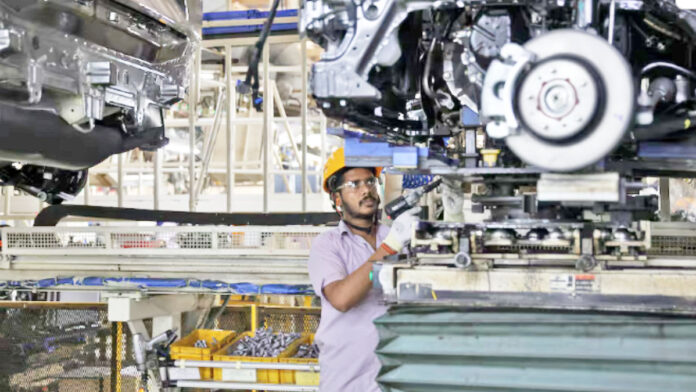NEW DELHI, June 10
India’s manufacturing sector is poised for a renaissance driven by the strategic integration of Industry 4.0 technologies. This digital transformation journey holds immense potential to propel India to the forefront of global manufacturing. With anticipated investments exceeding $200 billion by 2025, the vision is to elevate the sector’s contribution to GDP to 25% by 2026. Moreover, recent research by McKinsey and the World Economic Forum estimates that manufacturers and suppliers adopting Industry 4.0 in their operations could generate $37 trillion in value by 2025. This shift from traditional manufacturing to Industry 4.0 is poised to revolutionize the sector exponentially.
By embracing cutting-edge technologies like Cloud Computing, the Internet of Things (IoT), Artificial Intelligence (AI), and Big Data Analytics, Indian manufacturers can unlock a new era of intelligent production. Imagine seamlessly integrated production lines where machines communicate with each other (IoT), AI algorithms optimize processes based on real-time data, and production decisions are informed by predictive analytics – this is the future of Indian manufacturing.
Digital transformation fosters unprecedented levels of automation, flexibility, and operational efficiency. This translates to faster time-to-market, improved utilization of labor and assets, optimized service delivery, and enhanced quality control. Advanced monitoring systems, predictive maintenance powered by real-time data analytics, not only optimize production but also create a healthy and safer working environment. Furthermore, integrating digital twins and predictive analytics empowers data-driven decision making, enabling manufacturers to react swiftly to market fluctuations and stay ahead of industry innovation.
One of the most significant and promising aspects of Industry 4.0 is its potential to reshape the gender dynamics within traditionally male-dominated industries. Automation and robotics have minimized the need for physically demanding tasks, opening doors to many opportunities for strategic, supervisory, and technical roles. Such opportunities for women contribute to a more diverse and innovative working environment.
Micro, Small, and Medium Enterprises (MSMEs) are the lifeblood of the Indian economy, constituting over 90% of businesses. However, a significant productivity gap exists compared to larger players. In India, for example, MSMEs are only 26% as productive as large companies, representing a 74% productivity gap.
To bridge the productivity gap with larger companies, MSMEs need a comprehensive support system. This includes targeted R&D resources to address their specific challenges, financial and technical assistance to adopt Industry 4.0 technologies, capability building programs to equip them with the knowledge to navigate digital transformation, and workforce skilling initiatives to reskill and upskill their employees for the new technologies and processes. The lynchpin of Industry 4.0’s success is a robust infrastructure that prioritizes a consistent and efficient power supply to fuel advanced technologies, ubiquitous high-speed digital connectivity across the nation, and the implementation of robust cybersecurity frameworks to safeguard critical data and infrastructure. Initiatives like Digital India, with a total budget of ~INR 14,903 Cr, are poised to make significant strides in this direction. Implementing Industry 4.0 requires substantial investments. While existing schemes like Production Linked Incentive (PLI) and Foreign Direct Investment (FDI) provide a strong foundation, dedicated policies and funding mechanisms are needed to specifically encourage digital transformation initiatives across all industry segments. The journey to Industry 4.0 requires a cultural shift within organizations. Cultivating a culture of collaboration, open communication, and a willingness to embrace change are critical success factors. Leadership needs to champion the digital transformation vision and communicate it effectively to all stakeholders, including the workforce. Initiatives like ‘Make in India’ have laid the groundwork for this transformation.
By leveraging Industry 4.0 technologies, India can achieve significant strides in efficiency, productivity, and global competitiveness.
A robust policy framework, strategic investments, workforce development programs, and a focus on MSMEs will be instrumental in propelling India’s manufacturing sector to the forefront of the global stage. This tech-driven transformation promises not only unprecedented growth and innovation but also the potential for India to emerge as a global manufacturing powerhouse.



























